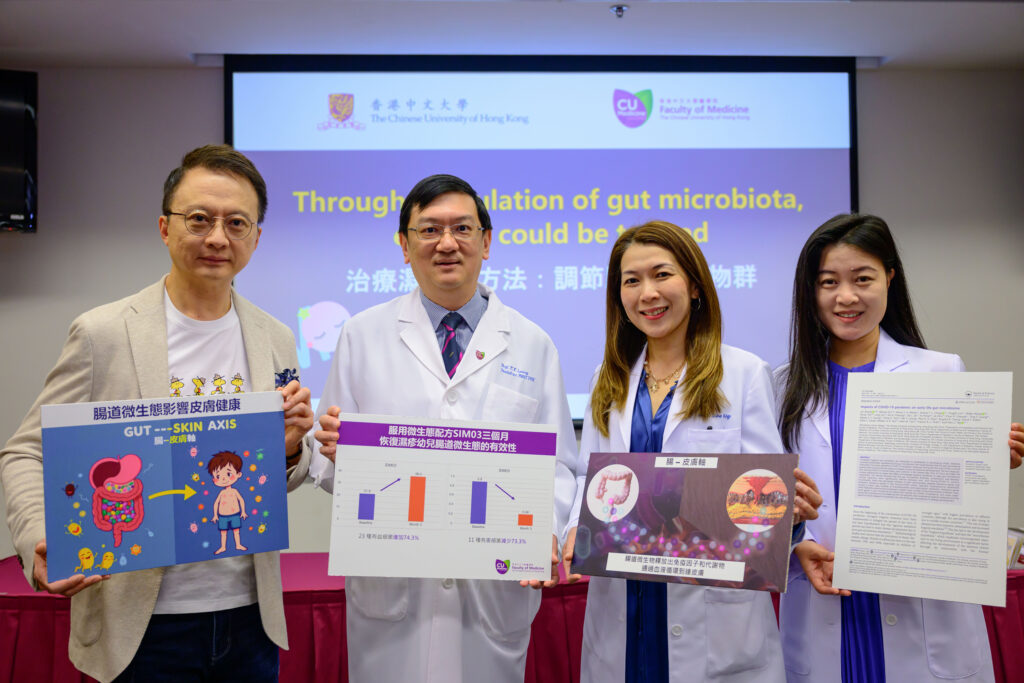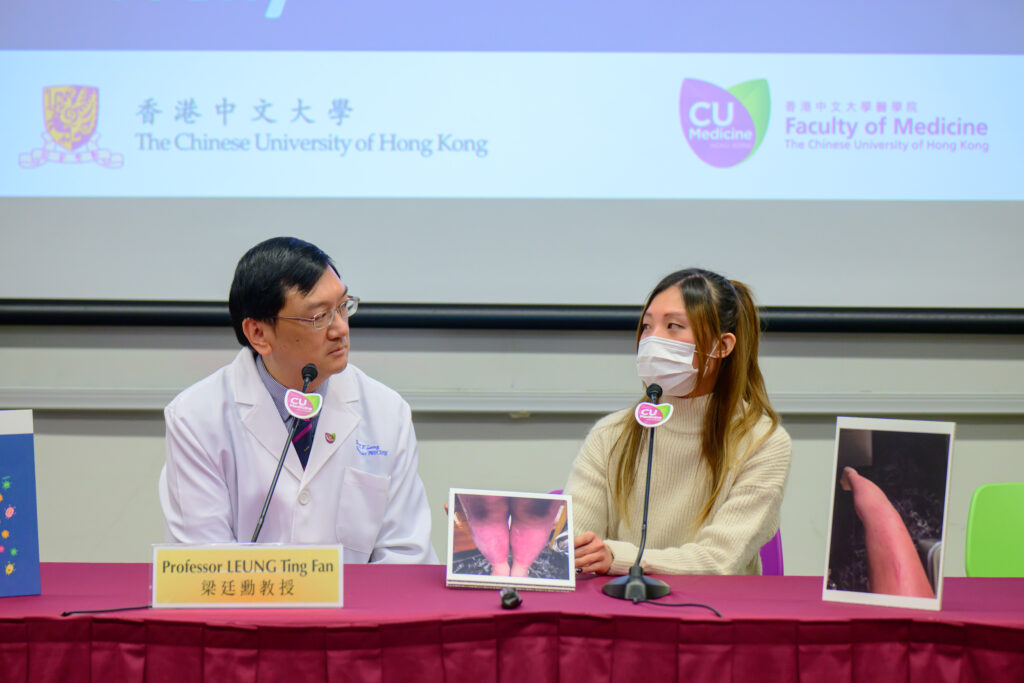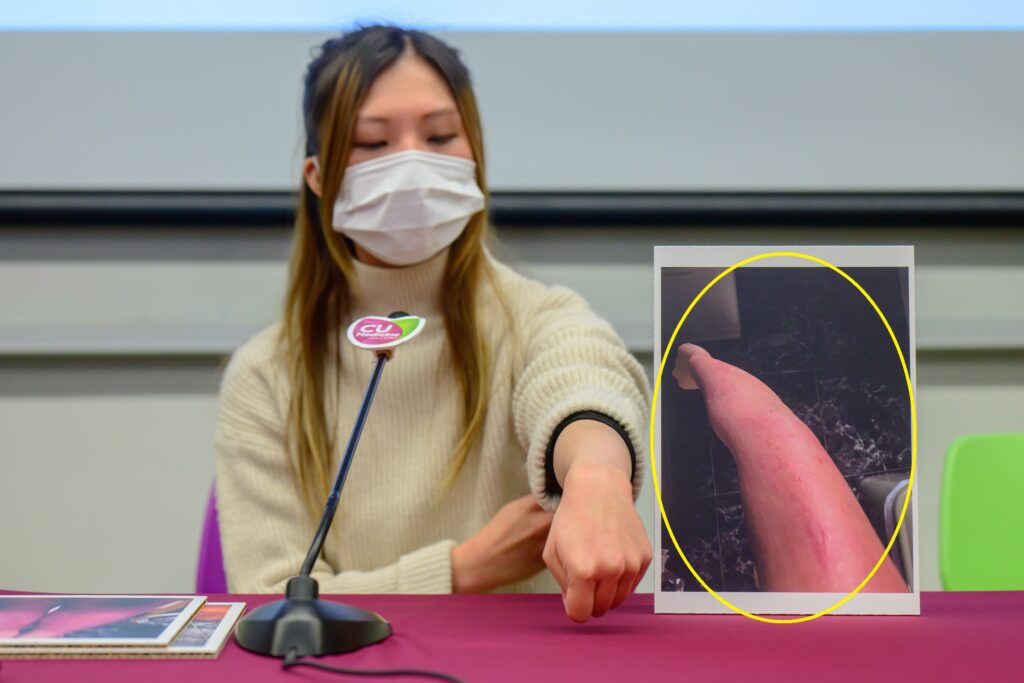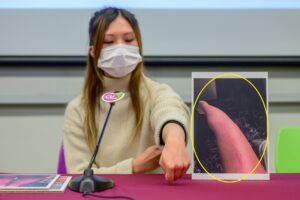CUHK
News Centre
CUHK study finds vigorous disinfection linked to increased risk of eczema and atopic diseases
International studies have reported that cases of eczema and other allergy diseases in infants born during the COVID-19 pandemic had significantly increased. This observation can be explained by the “hygiene hypothesis”, which suggest that a lack of early childhood exposure to particular microorganisms impairs the development of the immune system, increasing the risk of atopic and immune diseases.
A gut microbiome research team from The Chinese University of Hong Kong (CUHK)’s Faculty of Medicine (CU Medicine) conducted a large-scale study to explore the burden of eczema in Hong Kong and its underlying causes. By analysing data from 1,152 children, they found a 46% increase in the incidence of allergy in toddlers born in Hong Kong during the pandemic when compared to before the pandemic. By sequencing 700 infant stool samples, researchers also found that beneficial bacteria associated with immunity decreased in the gut of babies born during the pandemic than before the pandemic.
The gut-skin axis: the interrelationship between the gut microbiome and skin conditions
In recent years, a number of studies have highlighted the close relationship between gut dysbiosis and a variety of skin conditions including but not limited to eczema, acne, urticaria, psoriasis and hair loss. Gut microbiota plays a crucial role in regulating the immune system. The interrelationship between gut microbes and skin conditions is known as the “gut-skin axis”. The environment that infants and young children are exposed to affects the formation of their gut microbiota. Although a clean environment lowers the risk of bacterial infections, it limits the functioning of bacteria in promoting a healthy immune system. Overuse of antibiotics further reduces beneficial bacteria in the gut. The research team anticipated that gut dysbiosis in babies born during the COVID-19 pandemic was worsened by increased hygiene and sanitation, potentially leading to more atopic diseases as a result of a dysregulated immune system.
Incidence of allergy 46% higher in infants born during COVID-19 pandemic
To assess the impact of increased hygiene standards during the pandemic on the gut microbiome and adverse health effects, the CU Medicine research team analysed data from a prospective, longitudinal birth cohort MOMmy (MOther-infant Microbiota transmission and its link to long terM health of babY), to compare the gut microbiome of infants born before and during the COVID-19 pandemic and determine the incidence of allergy in early life.
Results showed a 46% increase in the incidence of allergy in infants born during the pandemic. The gut microbiome diversity and richness were reduced during COVID pandemic. There was significantly fewer antimicrobial peptide resistance genes in their gut which were crucial for building immunity. The findings have been published in a leading microbiome journal Gut Microbes.
Professor Zhang Lin, Assistant Professor, Department of Anaesthesia and Intensive Care at CU Medicine and Lead Scientist at the Microbiota I-Center (MagIC), said: “Our study showed that excessive cleaning hinders the development of a healthy gut microbiome in infants and likely increases the risk of atopic diseases including eczema. We call on parents to review their daily sanitation habits. They should avoid overcorrection, and allow their children to be exposed to different environment, enhancing the abundance and diversity of microbiota in the gut that could be associated with a reduced risk of allergies in the future.”
CUHK-developed oral microencapsulated live bacteria preparations, SIM03 and SIM05, improve eczema severity in children and adults, respectively
The CU Medicine research team utilised metagenomics and machine-learning to develop two unique oral live microbiome preparation, SIM03 and SIM05, which targets children and adult with eczema, respectively. These microbiome formulas were developed using microencapsulation technology to encapsulate individual bacteria for better colonization in the gut.
Two separate pilot studies of children and adults suffering from moderate to severe eczema showed that the severity of eczema, quality of life and sleep quality improved after 12 weeks of treatment. They also found increased in 23 types of beneficial bacteria in the gut based on metagenomic sequencing. Details of the study have been published in Scientific Reports, a publication of the Nature group.
Professor Leung Ting-fan, Alice Ho Miu Ling Nethersole Charity Foundation Professor of Paediatrics from CU Medicine, said: “The number of new cases of eczema in children has increased substantially after the COVID-19 pandemic and we believe this is closely linked to changes in hygiene and sanitation habits. Regulating microbiota in the gut present a novel and effective way to improve eczema in children and adults.”
Professor Siew Ng, Croucher Professor in Medical Sciences at CU Medicine, Director of MagIC and New Cornerstone Investigator, said: “The gut microbiome is considered one of the largest organs in the human body and altered microbiome composition can contribute to allergies and atopic dermatitis known to affect over 200 million people worldwide. We need rigorous scientific data, robust clinical studies and new approaches to treat these conditions and modulating the gut microbiome represents a promising and safe avenue.”
The research was supported by the InnoHK Programme of the Hong Kong Special Administrative Region government.
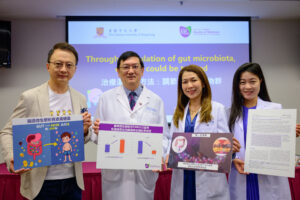
CU Medicine study finds a 46% increase in the incidence of allergy in toddlers born in Hong Kong during the pandemic when compared to before the pandemic. By sequencing infant stool samples, researchers also found that beneficial bacteria associated with immunity decreased in the gut of babies born during the pandemic than before the pandemic. The study shows that excessive cleaning hinders the development of a healthy gut microbiome in infants and likely increases the risk of atopic diseases including eczema.
(From left) Professor Francis KL Chan, Choh-Ming Li Professor of Medicine and Therapeutics at CU Medicine, Director of the Centre for Gut Microbiota Research and Co-Director of Microbiota I-Center (MagIC); Professor Leung Ting-fan, Alice Ho Miu Ling Nethersole Charity Foundation Professor of Paediatrics at CU Medicine; Professor Siew Ng, Croucher Professor in Medical Sciences at CU Medicine, Director of MagIC and New Cornerstone Investigator; and Professor Zhang Lin, Assistant Professor, Department of Anaesthesia and Intensive Care at CU Medicine and Lead Scientist at MagIC.
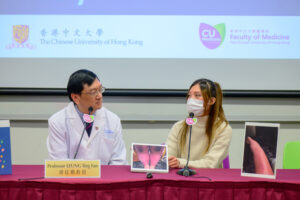
Eczema sufferer Venus (right) says her eczema condition went uncontrollable in last November due to pressure from work and a change in diet and sleep habits. Her skin was dry and itchy that she could not help scratching. The wounds were draining pus and blood. Her legs swelled two to three times larger than her size which made her difficult to walk. She sought a variety of ways to treat her condition “inside-out”, including Chinese medicine, change of diet and rest habits and taking the CUHK-developed microbiome formula. Her skin condition started to improve 2-3 weeks after the treatments.


